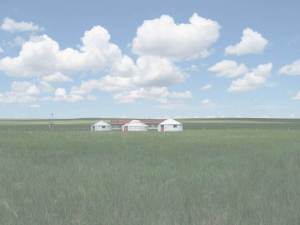
From the Field: A research journey to China. Sarah Evans
by Sarah Evans
I split my summer doing research in China between two drastically different settings: the city of Beijing, where I worked with a lab group at a university, and the rural farmlands of the Inner Mongolia province, where my lab group and I collected field data. Beijing was large, swarming with people, and was undergoing extensive renovations, as it was the summer before the 2008 Beijing Olympics. Navigating the city and its 15 million people on a daily basis was an adventure on its own, but amidst the culture shock my lab group and I planned our nearing trip to the grasslands for fieldwork.
Inner Mongolia, once a part of the country of Mongolia, is very much Mongolian in culture. It too had undergone significant changes in the previous decade, but certainly retained its rural charm, as well as its blue skies and green grass, missing in the city. Going from site to site, we conversed with farmers and their families, often invited in for milk tea or given a tour of a traditional yurt. We sometimes discussed the new development projects, like convention centers or brand new roads, which stood out like sore thumbs, and the villagers were excited by but still a bit confused as to how these modern renovations would be used. Many were also intrigued by the “researchers” that took an interest in their land, culture, and region, and although I stood out much more than my Chinese colleagues, I began to sense that they were also missing the familiarity of their city.
I felt much more comfortable in Beijing the second time – my ability to navigate the city and the people, as well as communication between my lab group and I, had significantly improved during my summer, which improved my morale tremendously. Most people in my lab group had not spoken English since they learned it in high school, and many never outside a classroom setting. This limited much casual conversation, especially at first. Interestingly, their scientific English was extremely advanced, as most write for and publish in English language journals, but rarely speak English colloquially. In the end, we carried out a successful research project and I gained invaluable experience working in an international collaboration, all in a tremendously diverse and fascinating setting.
